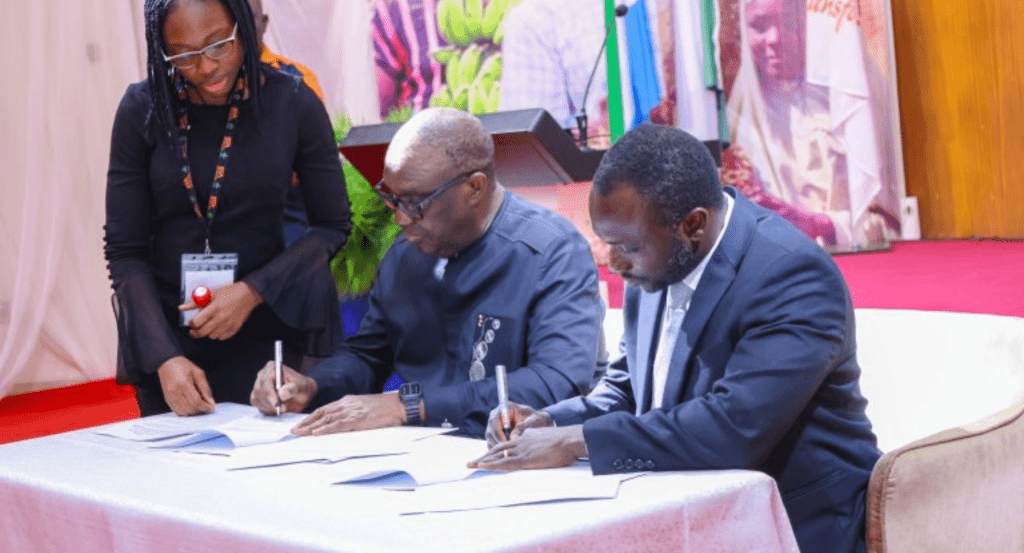The Fashola Agribusiness Industrial Hub is setting the pace for agricultural transformation in Nigeria, drawing international attention with its innovative approach to agribusiness. Recently, the hub welcomed the President of Sierra Leone, Julius Maada Bio, in a landmark visit that underscores its global relevance in agriculture and food security.
This visit follows Governor Seyi Makinde’s commitment to expanding agribusiness and strengthening economic ties between Oyo State and other African nations.
The Legacy and Revival of Fashola Agribusiness Industrial Hub
Located on 1,250 hectares of land in Oyo West Local Government, the Fashola Agribusiness Industrial Hub has a long-standing history. Originally established in 1946 by British colonialists for its rich agricultural potential, the farm later thrived under the Western Region government, gaining a reputation as a center for livestock research and production.
Under Governor Seyi Makinde’s leadership, the hub has been revitalized, integrating 10 agribusiness industries that process a variety of crops. The government’s strategic collaboration with private investors has significantly enhanced the hub’s capacity, with private investments surpassing state funding by over 100 percent.
Governor Makinde stated, “What private investors have brought into Fashola Farms is more than 100 percent above what the state government has put in here, and that is encouraging.” This model has not only boosted agricultural output but also positioned Oyo State as a Special Agro-Industrial Processing Zone (SAPZ) designated by the African Development Bank (AfDB).
Global Recognition for Fashola Agribusiness Industrial Hub
The Fashola Agribusiness Industrial Hub continues to attract international stakeholders, including the International Institute for Tropical Agriculture (IITA) and African leaders. During his visit, President Julius Maada Bio commended the Oyo State government’s agricultural advancements, noting that Sierra Leone aims to adopt similar strategies.
At the Presidential Visit Programme held at IITA, Governor Makinde emphasized the state’s focus on sustainable agricultural policies. “We don’t just talk; we walk the talk, and we will continue to do whatever we say we are going to do,” he declared.
In addition to modernizing agribusiness, the Oyo State government is leveraging the African Continental Free Trade Area (AfCFTA) to expand agricultural exports and enhance food security. The administration has also launched educational programs in partnership with IITA to equip young people with essential agricultural skills.
Strengthening Africa’s Agriculture Through Collaboration
During a panel discussion, Governor Makinde joined other African leaders, including Governor Babagana Zulum of Borno State and Governor Caleb Mutfwang of Plateau State, to discuss strategies for expanding agribusiness.
President Julius Maada Bio highlighted the importance of reducing Africa’s dependence on food imports, stating that investing in local agricultural production will boost the economy and create job opportunities. Experts at the event also urged African governments to fulfill their commitment to allocating 10 percent of national budgets to agriculture.
As part of its expansion plans, Oyo State is developing new agribusiness industrial hubs in Eruwa and Ijaye, in collaboration with the French government. These initiatives aim to increase production, attract investors, and strengthen Nigeria’s agricultural sector.
SEE ALSO: Navigating Food, Agriculture, and Inflation
Conclusion
The Fashola Agribusiness Industrial Hub stands as a beacon of agricultural transformation, attracting global partnerships and investments. Governor Seyi Makinde’s forward-thinking policies have positioned Oyo State as a leader in agribusiness development, with far-reaching impacts on food security, job creation, and economic growth.
With the continued expansion of agribusiness in Oyo State, the Fashola Agribusiness Industrial Hub remains a powerful model for sustainable agricultural development in Africa.




















